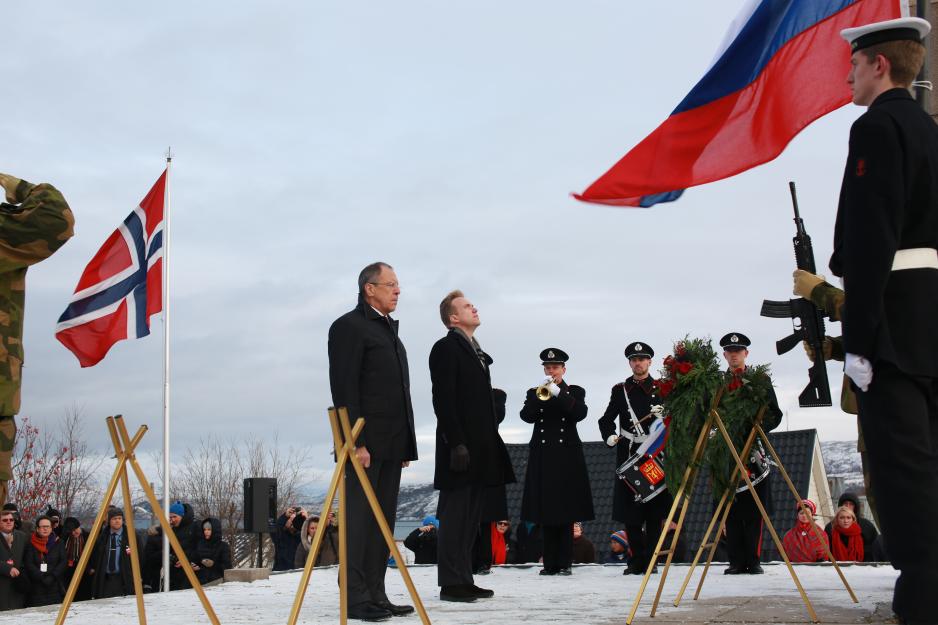Newsletter: The Naked Truth of the North

The Norwegian and Russian Foreign Ministers placing wreaths on the memorial for the Soviet liberation of Kirkenes in 2014. When Finnmark County organises a history conference to commemorate the 75th anniversary for the liberation of eastern Finnmark, there will be no attendance from the top political level.
(Photo: The Barents Secretariat)
Dear High North News reader!
Norway grows – just not in the High North. That is, once again, the conclusion following Statistics Norway’s presenting population statistics and extrapolations this week. "Everyone" agree that we need to increase population figures in the North in order to achieve our goals about growth and development in the Arctic. Yet it appears that "no one” holds the answer to how to achieve those goals. Dean Erlend Bullvåg at Nord University Business School warrants an honest mustering of resources for the future of Northern Norway. He argues that the lacking will to do so is related to the almost total lack of political discussion about how to make North Norwegian municipalities attractive – and for whom.
The fact that not one single representative from the Norwegian government will go to Finnmark for a historic history conference to mark the exact 75 years' anniversary for Soviet soliders marching across the country's northern border to liberate Kirkenes from German occupation, makes County Mayor Ragnhild Vassvik ponder. "It is a bit disappointing", she says to High North News. "The Defense Minister has other important business on these dates", the MoD says in a statement.
If we do not know how to appreciate the fact that the North holds an abundance of opportunities, then at least there are others who know. This week, we could tell you that the French cruise ship ‘Le Commandant Charcot’, the world’s first cruise ship with icebreaker capacity, plans on sailing to the North Pole in 2021.
Russian Novatek continues its expansion in the Arctic. This week, the company signed a contract for a new LNG2 project estimated at USD 20 billion and ordered four new LNG carriers.
We also ask if the USA barks more than it bites when the US Coast Guard Admiral says that the new icebreaker will only rarely be sailing to the Arctic. His statement was given only days after signals, including on-stage in Rovaniemi, were given that the USA will challenge Russia’s military influence in the Arctic region.
Let’s stay in Russia a bit longer. Both Norwegian and Russian offices have for quite some time now worried about the environmental problems related to the production at the Nikel plant, which is located only few kilometers from the Norwegian-Russian border.
The Nikel plant emits 100,000 tons of Sulphur dioxide annually, which is five to six times as high as the accumulated Norwegian emissions. However, Sergey Ivanov, President Putin’s Special Advisor on Environmental Protection, Ecology and Transportat, says to High North News that he refutes the notion that Nikel plant emissions constitute a problem. “The problem is largely mythologized […] There are no longer emissions from this plant”, he says. However, he is not supported by scientist Tore Flatlandsmo Berglen at the Norwegian Institute of Air Research (NILU), who comments on the Ivanov statements: “He is a political advisor. I, as a professional scientist, have to say that what he says does not ring true.”
But what if there is technology that can prevent emission of hazardous gases? The phenomenon is called climate engineering and is currently a hot issue. The technique that is most debated is that which aims at methods to block the sun’s rays, so-called solar radiation management. Others are talking about helping the ocean through pumping rich and more CO2-absorbing water masses from the depths to the surface. The Climeworks tech company in Switzerland develops plants that suck CO2 out from the atmosphere to transform it into a material matter. None of these solutions have been tested in any greater scale. However, the demand for technological disaster assistance is currently so great that political battles have erupted between those who see advantages in using technology to counter climate changes, and their opponents who fear irreversible damage to nature or political undermining of the Green Shift. The opponents argue that climate energy will give Saudi Arabia, Donald Trump, Vladimir Putin and others with personal interest in continued use of coal, oil and gas, with an excuse to continue “business as usual”.
This was a summary of some of the many stories you have found in High North News this week. Other stories we would like to highlight include:
Web Portal on Arctic Climate Science Bridges Education Gap
In Visit to Arctic Region, PA Leadership Explores Local and Global Impact of Climate Change
We wish you all the best for the weekend!
Siri Gulliksen Tømmerbakke,
News Editor, High North News
